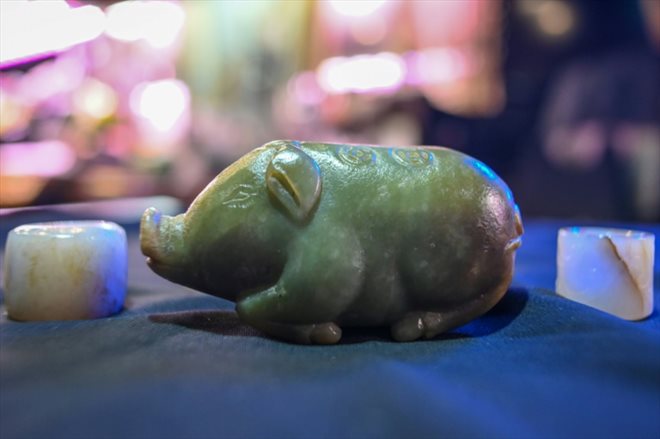A jade ring dating from the early Qing dynasty (1636-1911) pictured on July 5, 2023 in the window of a jade shop in Taipei (AFP/Archives/Sam Yeh)
An antique dealer in Taiwan examines the tiny ears of a small jade pig that fits in the palm of his hand, then confirms the authenticity of this four-century-old piece.
“The folds in the pig’s ears testify to ancient craftsmanship” from the Ming Dynasty (1368-1644), says the 60-year-old expert, who gave only his last name, Lee.
“The size is very neat. If it was a copy, they wouldn’t be so delicate and detailed,” he explains.
Mr. Lee’s shop in the Da’an district of Taipei contains old jade treasures whose value exceeds that of some buildings in the district.
The total amount of its merchandise represents only a tiny part of the fortunes brewed by ancient jade whose sales brought in, according to the Jade Association in Taiwan, nearly 16 million dollars a year before the pandemic.

Jade pieces in a shop in Taipei on July 19, 2023 (AFP/Archives/Sam Yeh)
But traders warn that the sector is now running out of steam amid a slumping global economy. Buyers have become much more cautious in a market flooded with counterfeits.
With relations between Taipei and Beijing deteriorating since the election of Taiwanese President Tsai Ing-wen in 2016, the mainland’s biggest buyers remain absent due to travel restrictions.
Seven years ago, “the period was very good for Taiwanese who traded in antiques or jade,” said Liu San-bian, who runs a store at the Metropolitan Jewelry and Antiques Emporium.
“It declined when politics slowly affected cross-Strait travel,” he adds, summarizing the current situation as a dilemma: “Hard to buy, hard to sell.”
“The Chinese have stopped coming and the wealthy in Taiwan are no longer buying. There is no supply from the market (…) and collectors here are not willing to put their items up for sale,” says Mr. Liu.
– “Precious national treasures” –
Long before Taiwan gained its reputation for manufacturing high-tech semiconductors, it was a favorite haunt for lovers of Chinese antiques, mostly brought out of mainland China during the Cultural Revolution and brought to Taiwan. and in the Hong Kong region.

A jade pendant from the Qing dynasty (1636-1911) in a shop in Taipei on July 5, 2023 (AFP/Archives/Sam Yeh)
The Chinese government generally considers the trade in historical antiquities to be illegal if these pieces have not been inherited or purchased from authorized places, such as cultural relics stores.
But there is a gray area in Taiwan, where collectors claim to have obtained the items through legitimate means, especially if they are personal items.
“Taiwan collectors started collecting when they realized they were precious national treasures,” Chang Juben, president of the Taiwan Jade Collecting Association, told AFP.
“In the vast Chinese community, Taiwan’s reputation is that one can come here to see, touch and buy quality jade.”
The ancient jade market took off around 2011 when Ma Ying-jeou, a friend from Beijing, was chairman, “then the flow of buyers from China and other countries was unceasing,” Chang recalls.
Today, the Taiwanese market is worth about a quarter of its annual value – around $9.4 million to $15.7 million during the boom years – and it’s easy to be steered towards inauthentic artifacts.
“The market is based on word of mouth,” says Chang. “You have to know where to go and find the right interlocutor”.
Most reputable collectors are “protective” of their treasures and do not reveal their choice pieces to first comers who probably do not know how to appreciate their quality, nor to speculators.
– “Building a reputation” –
A two-hour flight away, Hong Kong, a hub of Chinese antiquities sold both in the maze of markets and at high-end auction houses, tells a whole different story.
Pola Antebi, vice-president of Christie’s in Hong Kong, says she is seeing a trend where antique collectors are giving away collections that are between 30 and 50 years old.

A jade pig from the Ming dynasty (1368-1644) in a shop in Taipei on July 5, 2023 (AFP/Archives/Sam Yeh)
“We have sold several important collections from Taiwan to Hong Kong in recent years, including the remarkable collection of antique jade from Chang Wei-Hwa,” she says.
His collection of jade antiquities from the Qin and Han dynasties sold for $9.3 million in November, while Mr. Chang’s three previous sales brought in $24.7 million between 2019 and 2021.
Despite the slowdown in activity in Taiwan, jade players on the island remain convinced that the trade “will survive no matter what”, assures Mr. Lee.
His shop, which houses aquariums of iridescent corals, attracts visitors thanks to word of mouth. Multiple trips may be taken before a transaction is completed, if at all.
“It takes a very long time to build a reputation, but it is very easy to ruin it. All it takes is for a piece sold to be a fake (…) to ruin you.”
© 2023 AFP
Did you like this article ? Share it with your friends with the buttons below.




